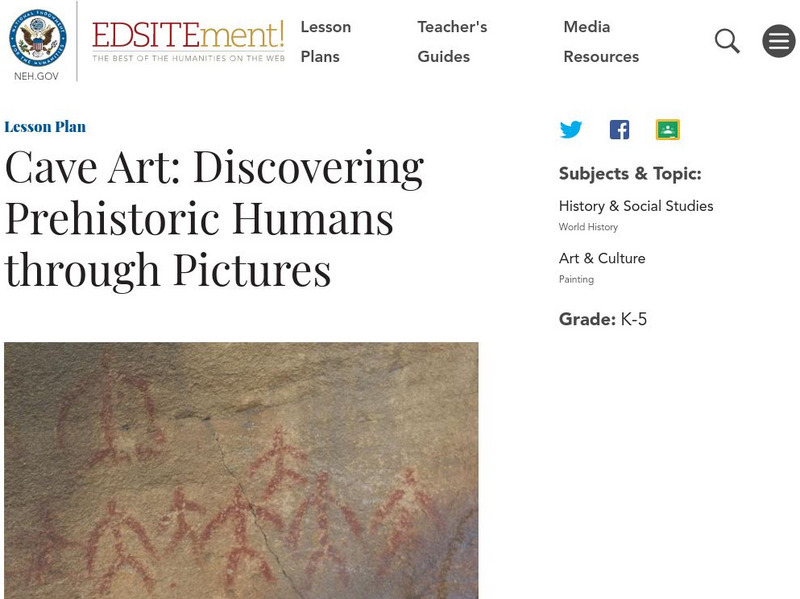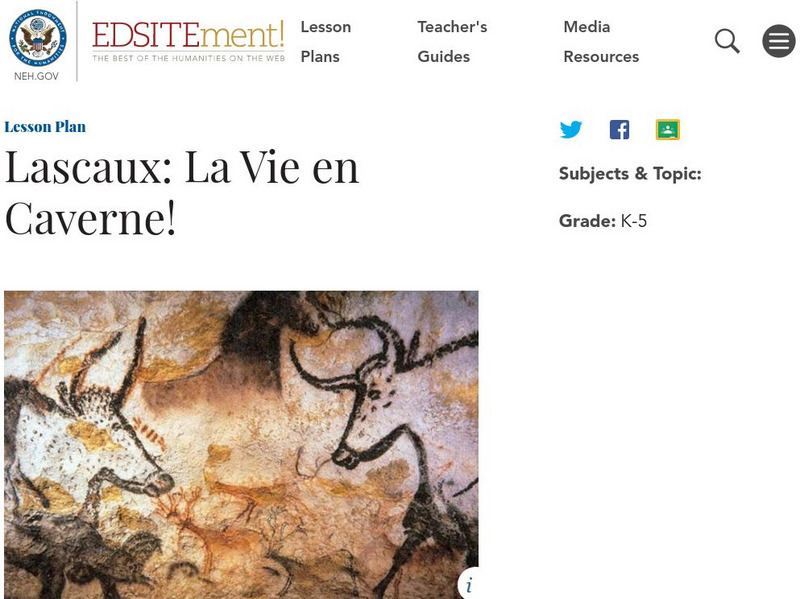Hi, what do you want to do?
Curated OER
Lascaux Cave Art on Ceramic Stones
Here is a great way to incorporate art into your next unit on prehistoric people. The class makes stones out of ceramic clay and then creates paintings like those found in the Lascaux Caves in France. A video link, full day-by-day...
Curated OER
Cave Art Revisited: A Lesson on Recreating Prehistoric Art
This could be a very enriching and beautiful project for your class. They learn about the amazing prehistoric Lascaux Cave and view images of the art found there. They review vocabulary common to both Anthropology and ceramics, then...
Curated OER
La Vie en Cave!
Students investigate the cave paintings of France. They explore various websites, recite and discuss french vocabulary terms, create a painted cave wall, and view and discuss images of French cave paintings.
Curated OER
Cave Art Revisited
Students research the sources of prehistoric cave paintings and engage in an activity of creating their own cave art. The lesson focuses on the design, composition style of the art, and importance of cultural contributions cave painting...
Curated OER
Cave Paintings: Studying the Past
Students are introduced to prehistoric paintings with the cave art at Lascaux and Altamira. They, in groups, role-play the members of a clan and design appropriate cave paintings for their group.
Curated OER
Cave Art
Young scholars explore cave art. In this Neolithic Age lesson plan, students get into groups and research a given topic. Young scholars create a poster with information and visual aids. Students then look a pictures and watch a DVD...
Curated OER
La Vie en Cave!
Students explain the purpose of cave paintings and rock art, identify some of the animals that roamed France in prehistoric times, appreciate the methods used by ancient civilization to create cave and rock art, and use appropriate...
Curated OER
Cave Art: Discovering Prehistoric Humans through Pictures
Learners explore how people in earlier times used art as a way to record stories and communicate ideas by studying paintings from the Cave of Lascaux and other caves in France. Three lessons on one page.
Curated OER
Cave Paintings
Students examine various types of prehistoric art. In groups, they research the purpose of the drawings and use the internet to research the various ancient human groups. To end the instructional activity, they draw animals compared to...
Curated OER
Cave Painting
Students research ancient cave art in France via the internet. They apply the skills and information by creating their own cave art.
Curated OER
Cave Art: Discovering Prehistoric Humans through Pictures
Students explore how people in earlier times used art as a way to record stories and communicate ideas. By studying paintings from the Cave of Lascaux and other caves in France, students discover that pictures are more than pretty colors.
Curated OER
The History of Art
Teachers can use these art history lesson plans as a way to get students to look at art in a new light.
Curated OER
Back to Basics
Students examine the unique and diverse historical artifacts that people have designed to fulfill their everyday needs in extraordinary ways. They identify ways humans have used design throughout history to enhance the ways they meet...
Curated OER
AP Vocab1 Word Search
In this language arts worksheet, high schoolers locate and identify various vocabulary terms related to their vocabulary. There are five words located in the puzzle.
Curated OER
Horse Sculpture (or animal of choice)
After a discussion on horse in art and a presentation on safety techniques using materials, learners construct a horse sculpture (or other animal of their choice) from sticks and natural fibers.
Curated OER
Cave Art: Discovering Prehistoric Humans through Pictures
Students understand how to "read" a picture and put together a series of images in a way similar to that of putting together words to form a story and gain knowledge about the past.
Curated OER
Murals With a Message
Young scholars recognize historical and cultural influences in art and appreciate art as a vehicle for public expression of ideas. They develop group skills, working together to produce a single mural or several related murals.
San Francisco Symphony
Music and Early Man
Creative projects are great ways to increase interest in topical research. Middle schoolers learning about primitive life styles in the Americas explore the importance of music to hunter gatherers. They research and create musical...
National Endowment for the Humanities
Neh: Edsit Ement: Cave Art Discovering Prehistoric Humans
By studying cave paintings, students learn about prehistoric cultures and the stories and ideas they wished to communicate to others through art. The lesson plan presented on this website aims to show young students the significance of...
National Endowment for the Humanities
Neh: Edsit Ement: Cave Art
This site contains very detailed lesson plans for teaching about cave art, specifically the Lascaux Cave. Within the site there are links to the Lascaux Cave website where students can explore the caves. The site also contains detailed...
Other
French Government Site: The Cave at Lascaux
This official government site for the Cave at Lascaux can be viewed in English, French, German and Spanish. This site provides a virtual tour, fun facts, a timeline, and more.
National Endowment for the Humanities
Neh: Edsit Ement: Lascaux: La Vie en Caverne!
In this lesson plan, students will consider "Lascaux: La Vie en Caverne!." The plan includes worksheets and other student materials that can be found under the resource tab.
Khan Academy
Khan Academy: Lascaux
The Caves of Lascaux are the most famous of all of the known caves in southwestern France because of what is contained inside - painted and engraved walls. These cave paintings have shown the very human need to communicate in the form of...
Scholastic
Scholastic: Online Theme Unit for Caves
Discover more about caves through this online interactive theme unit. This resource provides links to sea caves, cave animals, caves in the United States, the science of caves and more.




























